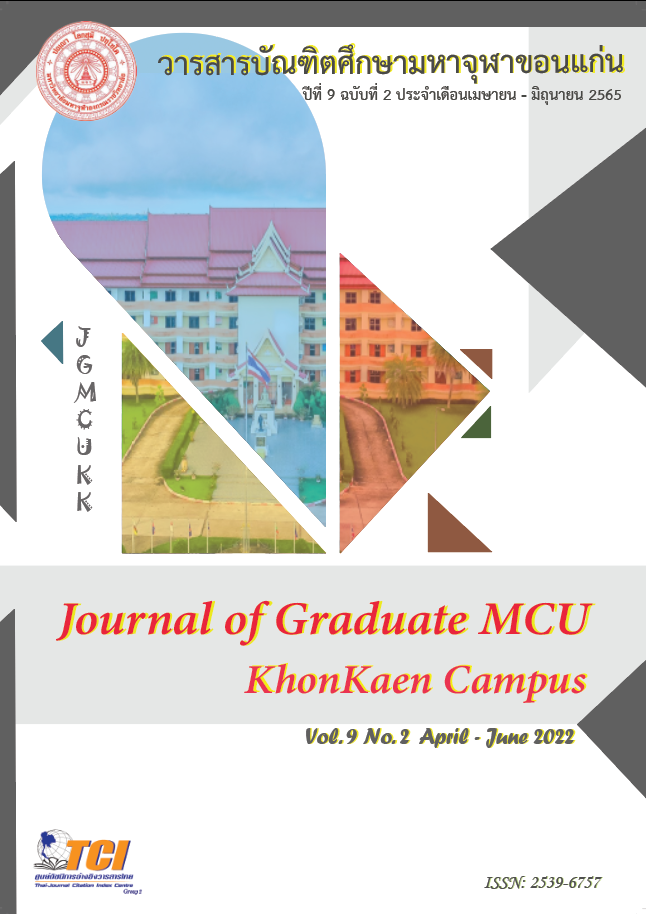An Analysis of Executive Morals Affecting the Efficiency of Cycling Teams in Nai Mueang Sub-District, Mueang District, Nakhon Ratchasima Province การวิเคราะห์คุณธรรมผู้บริหารมีผลต่อประสิทธิภาพทีมกีฬาจักรยานของตำบลในเมือง อำเภอเมือง จังหวัดนครราชสีมา
Main Article Content
Abstract
The objectives of this research were 1) to study the morality of the cycling team administrators 2) to study the morality of the cycling team administrators to increase the efficiency of the cycling team in Nai Mueang Sub-district, Mueang District, Nakhon Ratchasima Province. 3) To analyze the concept of using moral principles for effective management of the cycling team in Nai Mueang
Sub-district, Mueang District, Nakhon Ratchasima
Province. is a qualitative research Data were collected from primary, secondary, and in-depth interviews. There were 25 informants. Descriptive data were analyzed by inductive method.
The results showed that
1. The morality of cycling team managers is a concept derived from the philosophy of physical education, which is divided into 4 branches: philosophy of physical education according to the philosophy of education, idealism, realism, and experientialism. and existentialism to be used to create attitudes Develop personality, confidence, morality and ethics in management bike team
2. Responsibility, transparency, equality, value creation of cycling teams in the long term and promoting best practice The principles of cycling team management to increase efficiency are 1) being responsible for the results of their decisions and actions 2) being transparent and open 3) Treat all parties equally and fairly. 4) Focus on creating values for the cycling team and 5) promoting best practices.
3. Increasing the efficiency of cycling team management The executives have used Buddhist ethics as a form of self-domination, using the seven principles of
sappurisadhamma, which is to know the principles. Knowing intentions, knowing oneself, knowing moderation, knowing time, knowing people, possessing the four principles of Sangahavattha, i.e. sharing, using speech, helping, placing oneself, and in taking possession of work, using the 4 powers of power, namely Chanda, Viriya, Citta, Vimangsa through the following methods. said this makes More efficient cycling team management.
Article Details

This work is licensed under a Creative Commons Attribution-NonCommercial-NoDerivatives 4.0 International License.
References
คำพอง งามภักดิ์. (2543). จริยธรรมธุรกิจ : ศึกษาเปรียบเทียบแนวคิดประโยชน์นิยมกับแนวคิดพระพุทธศาสนา. (วิทยานิพนธ์ศึกษาศาสตรมหาบัณฑิต). กรุงเทพฯ: มหาวิทยาลัยมหิดล.
พระธานี เขมธมฺโม (จำปา). (2550). ศึกษาสัมมาอาชีวะในพระพุทธศาสนา. (วิทยานิพนธ์ปริญญาพุทธศาสตรมหาบัณฑิต). กรุงเทพฯ: มหาวิทยาลัยมหาจุฬาลงกรณราชวิทยาลัย.
พระพุทธโฆษาจารย์ (ป.อ.ปยุตฺโต). (2546). การพัฒนาที่ยั่งยืน. (พิมพ์ครั้งที่ 9). กรุงเทพฯ: สำนักพิมพ์มูลนิธิโกมลคีมทอง.
ภูพิงค์ สุวรรณ. (2556). การศึกษาการเตรียมทีมกีฬาจักรยานของสมาคมจักรยานแห่งประเทศไทยในการแข่งขันกีฬาซีเกมส์ ครั้งที่ 27. (วิทยานิพนธ์ปริญญาวิทยาศาสตรมหาบัณฑิต). กรุงเทพฯ: จุฬาลงกรณ์มหาวิทยาลัย.
เยาวพา นพศรี. (2545). การนำเสนอจรรยาบรรณของนักอบรมและพัฒนาทรัพยากรมนุษย์. (วิทยานิพนธ์ คุรุศาสตรมหาบัณฑิต). กรุงเทพฯ: มหาวิทยาลัยมหาจุฬาลงกรณราชวิทยาลัย.
วศิน อินทสระ. (2549). พุทธจริยศาสตร์. กรุงเทพฯ: สำนักพิมพ์ธรรมดา.
สุภาวดี นัมคณิสรณ์. (2550). ธุรกิจกับพุทธจริยศาสตร์. (วิทยานิพนธ์ปริญญาอักษรศาสตรมหาบัณฑิต). กรุงเทพฯ: จุฬาลงกรณ์มหาวิทยาลัย.
Garrett M., (2004). Health Care Ethics. New York: Baillie Harold W; & Garrett Rosellen.

